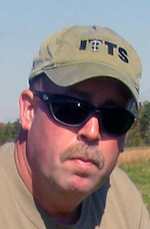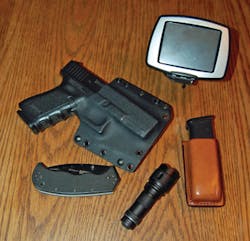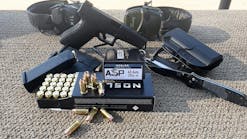It was around ten p.m. when we checked into our hotel. The return trip home from a two week vacation had us in the car, minus lunch and dinner breaks in restaurants, for about eight hours. After packing the car early in the day while checking out of our beach house rental, the drive had me a little tired. Grabbing our pre packed "hotel bag" out of the car I scanned the hotel parking area, then escorted my wife to our room.
After double locking the door and setting the security latch in place, I went about removing my Glock 19 from its holster as well as the spare 15 round magazine carried in a Bianchi single mag carrier. Together these items were set up on a chair close to the bed along with an LED flashlight and my iPhone.
The night was uneventful and the wife and I enjoyed a quiet night's sleep before continuing the very pleasant drive home the next morning with my 9mm pistol carried discreetly under my Columbia untucked short sleeve shirt.
No Martha, I'm Not Paranoid
Oftentimes when I write about off-duty topics such as this I get responses from the "I don't carry off-duty crowd" or those officers who state "I only carry a five shot snubby when I'm off" or the even worse decision makers, the "I'm on vacation I don't carry at all crowd." Certainly these are your choices to make but keep in mind that we will live and die based on the decisions we make. So too, our family and friends in our presence may live and die by our decisions as well. I chose to carry as much gun as I can comfortably carry concealed with enough spare ammo to handle most armed encounters I'm forced to engage in.
I've had a crack-head attempt to rob me once while in plainclothes and have seen entirely too many incidents, accidents and encounters while traveling or working to leave my awareness, mindset and preparations at work while traveling.
HR218 or more properly the "Law Enforcement Officers' Safety Act" allows law enforcement officers to carry concealed (as long as follow state laws on where they can and can't carry) throughout the U.S. why would you or I not want to take advantage of that?
Tragedy, like violent physical encounters, can strike anywhere at any time. Certainly our street experience has taught us that.
The Tools and Tricks to Safe Travel
Unless you are on official police business such as prisoner extradition, you cannot carry aboard the aircraft. But you can transport your handgun in checked luggage by packing it properly and declaring it at the airline counter. At this time (always good to check the TSA regs on this online which are available on-line), you may transport an "unloaded handgun" in your checked luggage by placing it a locked hard case which has been placed inside your suitcase. The hard case must meet TSA approval and must be locked with "non-TSA" locks. Ammunition must be carried separately in a case (factory boxes with bullet trays will suffice). My gun case is a GunVault Nano Vault with an attached cable. I purchased a gun vault with a combination lock so that I don't have to worry about losing the key. Standard protocol at my local airport (and there is always a lot of difference at airports in my experience) is that you declare the firearm and after receiving your boarding pass, are directed toward TSA employees who will ask for the combination. TSA will open and examine the firearm to ensure it is unloaded and give you a "good to go" acknowledgement.
You then pick up your luggage at baggage claim per normal. This process does require that you safely load and make ready in your rental car or hotel room upon arrival at your destination city.
I have heard of some passengers encountering issues with the TSA at some airports. This has not been my experience but you should budget in a little extra time to complete this process and make your flight.
In years past I would carry my Glock 19 in a pelvic pack versus a belt holster. Driving a distance this allowed me to transport my handgun, spare mag and a small BLACKHAWK! or similar flashlight in relative comfort. Since I purchased a Kydex Raven Phantom holster I have opted to carry in this rig as is my standard off-duty practice. I still had the flashlight in my vehicle's center console and could slip it into my pocket if necessary.
Recently, based on my own study and recommendations of the late firearms instructor Paul Gomez, I updated the first-aid kit I carry in my car. I now include a CAT (Combat Application Tourniquet), Israeli Combat Dressing, and Quick Clot hemostatic Sponge as well as my standard kit. During vacations in years past I've had the unfortunate experience of seeing my buddy in the car behind me have his car hit and totaled by a driver in a truck, had my youngest dislocate her toe on a play ground, fracture my arm, as well as various accidental lacerations and other injuries. Since I carry a gun for self-defense against an armed threat, it only makes sense to have the lifesaving gear to stop death from exanguination for me and my travel companions.
I purchased a Garmin GPS travel system years ago and still travel with it even though my iPhone has a navigation app. The Garmin allows you to exit your standard planned route of travel in case of detour or traffic back-up as well as aid in finding locations to dine, get gas or motels. Fortunately the price of these GPS devices has dropped considerably from my original purchase price.
Used to be that having a smartphone was a luxury and when you're trying to have a relaxing vacation constant connection to the world can be a pain but in their ability to surf the net and locate emergency contacts, navigate, summon aid as well as stay in contact with the driver's of other vehicles you are traveling with, smartphones are well worth the expense. Many a time when flying I've used my phone to communicate to my family my flight has been delayed or some other important travel data.
When staying at hotels or motels, a little advanced search on-line can provide to with safety issues such as if there has been a meth raid at the hotel where you're planning on staying. Even decent chain motels can be the site of mobile meth labs.
I like to make reservations in advance during my travels to ensure I have a room and the motel or hotel is clean and safe. Regardless, I check out the floor diagram and emergency exits prior to bedding down for the night. Having once worked security at night at a hotel, I'm more aware than most about the thefts, robberies, drug activity, prostitution, partying and related activity that can take place at these locations. Always lock and double lock the doors.
AAA membership aids the traveler in getting road side assistance as well as services such as TripTics and getting into your locked car when your 8 year old locked and then closed the doors with your keys in the ignition.
Wrap Up
Yes, you deserve a break from it all to enjoy the "fruits of your labor". But as an off-duty police officer responsible for your own as well as your family's security you cannot travel blindlywith your "spidey sense" left in your locker at work. LEOSA offers you the opportunity to travel while armed and I will take advantage of that option to improve my safety and the safety of my loved ones with whom I am traveling. Like safety on the job - a little prep landing and awareness go a long way to ensure you have a safe and violence free vacation.
Web Links:
- Advanced Tactical Concepts
- Travel Vault at Amazon.com
- TSA Firearms Policies
- Raven Concealment Holsters
Related Forums Discussions:
About The Author:
Kevin Davis is a full-time officer assigned to the training bureau where he specializes in use of force, firearms and tactical training. With over 23 years in law enforcement, his previous experience includes patrol, corrections, narcotics and he is a former team leader and lead instructor for his agency's SWAT team with over 500 call-outs in tactical operations.

Kevin Davis | Tactical Survival Contributor
Kevin R. Davis retired from the Akron Police Department after 31 years with a total of 39 years in law enforcement. Kevin was a street patrol officer, narcotics detective, full-time use of force, suspect control, and firearms instructor, and detective assigned to the Body Worn Camera Unit. Kevin is the author of Use of Force Investigations: A Manual for Law Enforcement, and is an active consultant and expert witness on use of force incidents. Kevin's website is https://kd-forcetraining.com/



